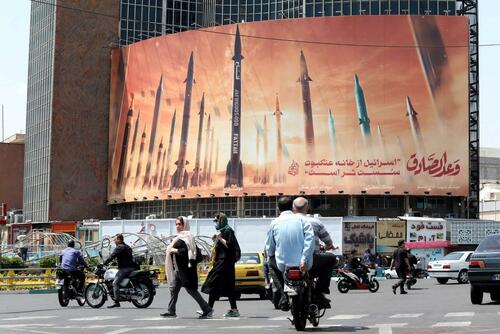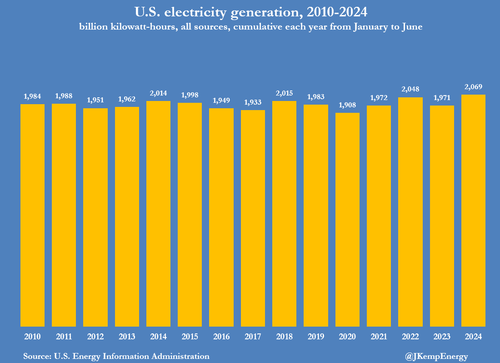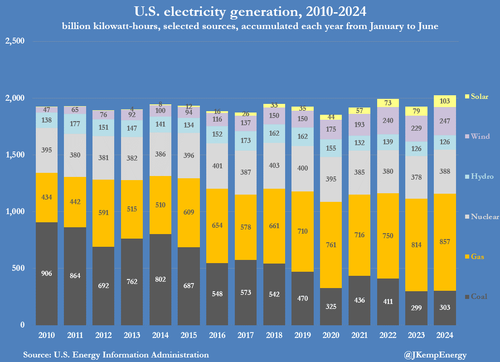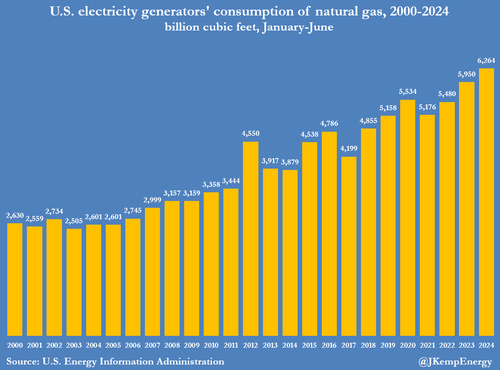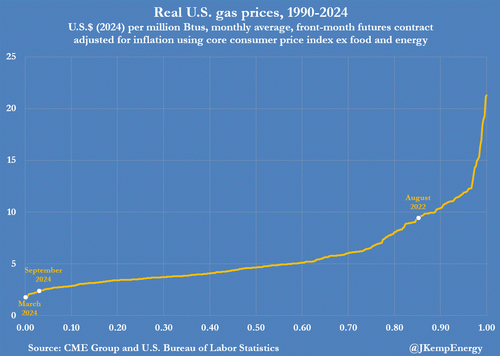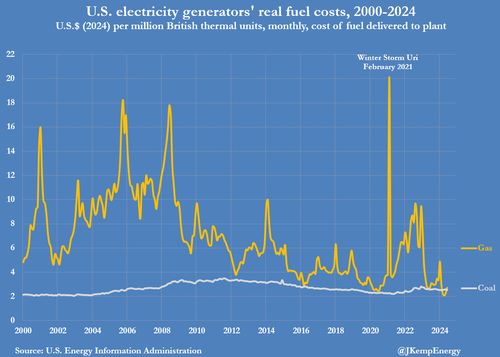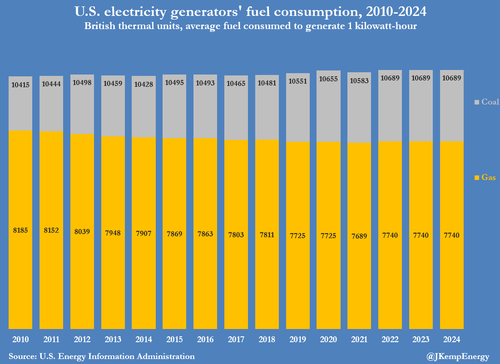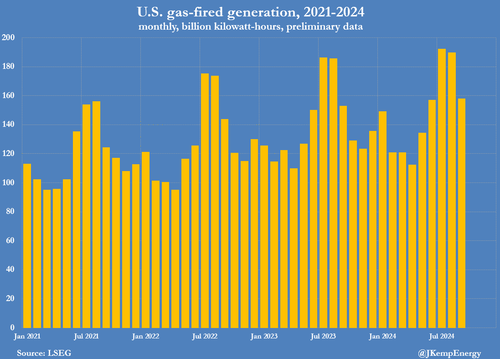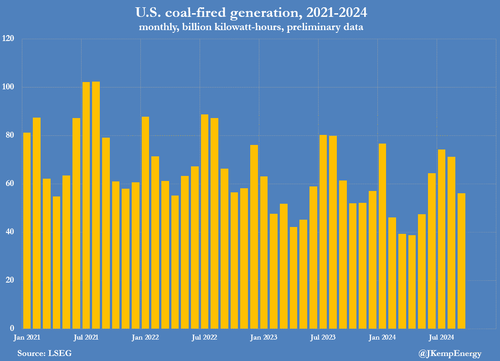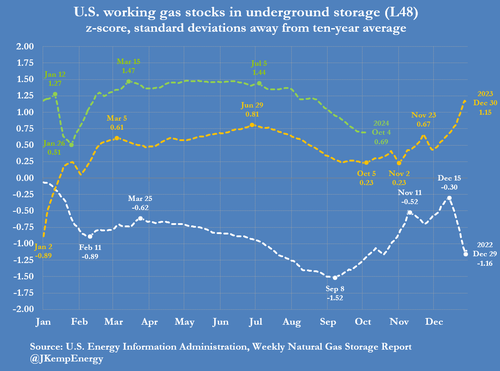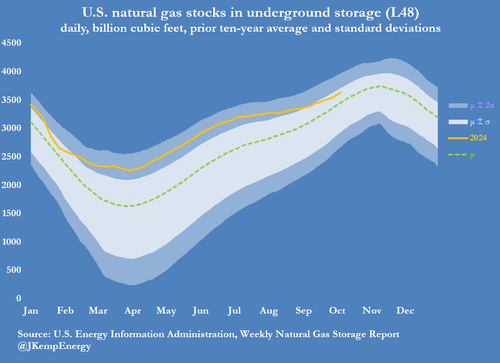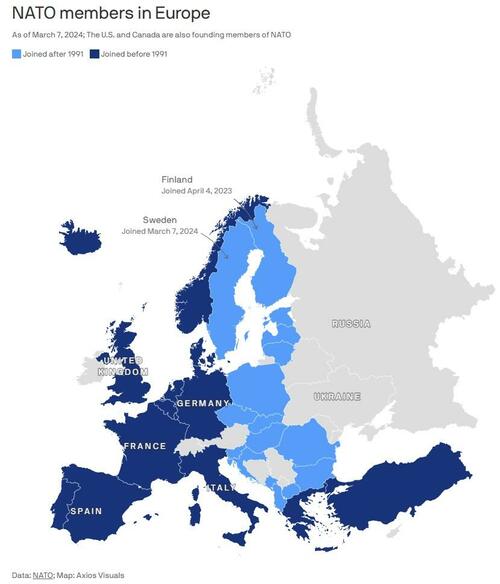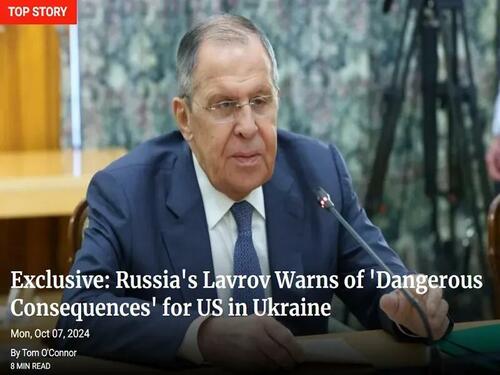How The Biden/Harris Admin Helped Iran Get To The Brink Of A Nuclear Bomb
Authored by Fred Fleitz via American Greatness,
Iran has made enormous progress in its nuclear weapons program during the Biden/Harris administration and reportedly can now enrich enough weapons-grade uranium to fuel nine nuclear bombs in one month. Although Iran may be nine months to a year away from having an operational nuclear weapon, recent attacks by Iran and Israel against each other’s territory have raised concerns that Iran’s rapidly advancing nuclear program could lead to a nuclear war in the Middle East.
Biden/Harris administration officials have tried to blame President Trump for the advances in Iran’s nuclear program because he withdrew from the 2015 nuclear deal with Iran, the JCPOA. Democratic Governor Tim Walz made this claim during the October 1 vice presidential debate when he said, “There had been a coalition of nations that had boxed Iran’s nuclear program in . . . Donald Trump pulled that program and put nothing else in its place.”
This is absolutely false. The huge advances in Iran’s nuclear weapons program are the result of major flaws in the JCPOA and a series of terrible national security policy decisions, including repeated attempts to appease Iran, by the Obama and Biden administrations.
The first of these bad policy decisions was when the Obama administration conceded to Iran the “right” to enrich uranium for peaceful purposes, such as nuclear medicine and nuclear reactor fuel.
This decision reversed the positions of prior Republican and Democratic administrations who believed Iran could not be trusted to enrich uranium for peaceful purposes because of covert Iranian efforts to establish a nuclear weapons program and because it is easy to reconfigure uranium centrifuges supposedly constructed for peaceful purposes to produce weapons-grade nuclear fuel.
Allowing Iran to enrich its own uranium for peaceful purposes has never made economic sense due to a glut of reactor fuel and nuclear medicine on the world market. Iran also does not need nuclear power due to its vast oil and natural gas reserves. Israeli Prime Minister Benjamin Netanyahu explained this to MSNBC’s Andrea Mitchell in an October 2014 interview when he said Iran’s centrifuges “are only good for one thing: to make bomb-grade material.”
The JCPOA Was a Dangerous Fraud
The Obama administration’s dangerous uranium enrichment concession to Iran was enshrined in the flawed 2015 JCPOA agreement which, allowed Iran to enrich uranium to reactor-grade and develop advanced centrifuges. In effect, this gave Iran the world’s blessing to continue to develop a uranium enrichment program whose only practical purpose was to make nuclear weapons fuel.
But it gets worse. The JCPOA lifted sanctions on Iran and provided it with $150 billion in sanctions relief. This included $1.7 billion in “pallets of cash” that the U.S. secretly flew to Iran in small planes as ransom to release five innocent Americans being held in Iranian prisons. A related UN resolution imposed limited, short-lived sanctions against Iranian conventional arms transfers, which expired in 2020, and missile transfers, which expired in 2023.
The JCPOA has a weak inspection regime that Iran did not cooperate with. This inspection regime was further weakened by secret side deals, discovered by then-Rep. Mike Pompeo and Senator Tom Cotton, that allowed Iran to evade inspections by the International Atomic Energy Agency (IAEA). Obama officials reportedly wrote the secret side deals and refused to share them with Congress.
And to top off this all off, there was substantial cheating on the JCPOA by Iran. This included clandestine efforts to acquire illicit nuclear technology and equipment, violating JCPOA restrictions on advanced centrifuge development, and excess production of heavy water.
In 2018, a huge cache of documents on Iran’s nuclear weapons program stolen by Israel provided evidence of massive Iranian cheating on the JCPOA, including several undeclared sites where nuclear weapons work had been conducted since 2015. IAEA inspection of two of these sites found evidence of enriched uranium particles, which proved covert nuclear weapons work had occurred at these locations.
In addition, Iran quietly worked to develop advanced centrifuge designs and parts in violation of the JCPOA between 2015 and 2020. This allowed Iran to start deploying advanced centrifuges in 2021. This included completing a factory in July 2018 to make carbon fiber rotors for advanced centrifuge machines.
These and other extremely serious weaknesses of the JCPOA are why Donald Trump justifiably called it “the worst deal ever” and why he withdrew the United States from this agreement in 2018.
Iran said it would no longer honor its JCPOA commitments after Trump withdrew from the agreement and began to slowly back out of JCPOA limits in 2019 and 2020. However, Iran did little to ramp up its uranium enrichment program until January 2021—weeks before Joe Biden’s inauguration.
The reason why there was not a surge in Iran’s nuclear weapons program during President Trump’s term after he withdrew from the JCPOA was because Iranian leaders were afraid of how Trump would respond. The global American deterrence Trump established helped keep Iran and other U.S. adversaries in check during his presidency.
Iranian Nuclear Weapons Program Takes Off Under Biden/Harris Administration
It is clear that Iran’s leaders were not afraid of Joe Biden. They saw a new American president desperate to revive the JCPOA and who would resume the Obama administration’s appeasement policies. The results have been a catastrophe for global security, with huge advances in Iran’s nuclear weapons program. Iran also gained at least $100 billion in additional revenue during the Biden administration because it refused to enforce U.S. oil sanctions. Most of this oil has been sold to China. Iran spent this windfall on its military, nuclear, and missile programs as well as to fund its terrorist proxy groups: Hamas, Hezbollah, the Houthis, and Shiite militias in Syria and Iraq.
The Biden administration took office in January 2021 determined to renegotiate the JCPOA to make it “longer and stronger.” Iranian officials repeatedly said they would not agree to changes to the JCPOA, but they participated in fruitless talks in Vienna to restore the JCPOA until March 2022. Not only did Iran refuse to negotiate in good faith in these talks, a Russian ambassador, with the assistance of a Chinese ambassador, ran the Vienna talks because Iranian diplomats refused to meet in the same room with their U.S. counterparts.
Iran significantly stepped up its nuclear weapons program while multilateral talks to revive the JCPOA were underway between April 2021 and March 2022. This included deploying advanced centrifuges in February and April 2021 and producing uranium metal in February 2021.
The most serious development was when Iran announced in November 2021 that it had enriched uranium to the 60% U-235 level for the first time. 60%-enriched uranium can be further enriched to 90% (weapons-grade) in about a week.
Biden officials worked hard to convince Iran to agree to a new nuclear deal by offering a series of dangerous concessions. This included proposing to take Iran’s Revolutionary Guard Corps off the U.S. list of terrorist organizations. Several members of the U.S. negotiating team resigned in late 2021 because they believed the concessions being offered to Iran were excessive and would lead to a bad nuclear agreement.
Multilateral talks with Iran to revive the JCPOA broke down in March 2022 after Russia threatened to block a new nuclear deal unless its trade with Iran was exempted from U.S. and European sanctions imposed on Russia due to its February 2022 invasion of Ukraine.
After the multilateral talks broke down, the Biden/Harris administration used Oman as an intermediary to negotiate a secret, oral, and unwritten agreement with Iran. Biden Administration critics claimed this was done to evade Congress’s oversight of this agreement.
The secret deal was described as an interim agreement with major U.S. concessions. These reportedly included freezing Iran’s enrichment of uranium to 60%. This concession meant the Biden/Harris administration agreed to accept Iran enriching to the dangerous 60% level. Iran was also allowed to keep its nuclear infrastructure, including advanced uranium centrifuges, and permitted to continue to develop this technology.
Iran reportedly agreed under the deal to stop its proxy groups from attacking U.S. forces in Syria and Iraq and to cooperate with IAEA investigations of its nuclear program. Iran never abided by either of these provisions.
In exchange for agreeing to the above requirements, Iran was to receive over $20 billion in sanctions relief. The U.S. also reportedly agreed not to impose new sanctions on Iran.
In addition, this agreement included a U.S.-Iran prisoner exchange and a U.S. ransom payment to Iran of $5 billion. This payment was frozen in October 2023 after the October 7 Hamas terrorist attack against Israel.
Meanwhile, Iran engaged in other malign activities during the Biden/Harris administration, such as selling attack drones and missiles to Russia for its use in the Ukraine War and working with Russia, China, and North Korea to form a new anti-West “axis.”
There also were significant advances in Iran’s missile program, including a possible hypersonic missile launch, advanced cruise missiles, space launches (which were believed to be ICBM test launches), and new missiles designed to evade missile defenses. It is unclear whether Iran fired its newest missiles during two missile attacks on Israel this year.
The Biden/Harris Administration’s Appeasement of Iran Caused the Middle East to Explode
The breakdown in security and stability in the Middle East since the October 7, 2023, massacre of Israelis by Hamas is a consequence of the Biden/Harris administration’s incompetent Iran policies. Their appeasement of Iran emboldened Iran and its terrorist proxies to attack Israel and U.S. troops in Iraq and Syria. Iran also attacked Israel twice in 2024 with missiles and drones.
There have been conflicting press reports of Iran’s involvement in the October 7 Hamas terrorist attack. The Wall Street Journal reported on October 8, 2023, that Iran helped develop and fund the Hamas attack and gave Hamas the green light to launch it. A Hamas spokesman told the BBC on October 8 that Hamas had direct support from Iran. However, although Iranian leaders praised the attack, they claimed that Iran was uninvolved in it. A senior Hamas official backed up this claim on October 9 by saying that Iran and Hezbollah were not involved in the Hamas terrorist attack.
Although Iran’s exact role in the horrendous October 7 Hamas terrorist attack is unclear, I also believe it will at least be proved that Hamas could not have conducted the attack without arms and funding from Iran.
Iran is Much Closer to Becoming a Nuclear Weapons State Because of the Biden/Harris Administration’s Incompetent Iran Policies
This article provides a summary of the profoundly incompetent and naïve Iran policies by the Biden/Harris administration that did enormous damage to Middle East and global security. Because of these deeply flawed policies, Iran today is enriching uranium at the 60% level, just below weapons-grade. It can enrich enough uranium to fuel nine nuclear weapons a month. Iran has installed advanced centrifuges that will significantly increase the amount and speed of the production of weapons-grade uranium if Iran’s leaders decide to do so.
Iran is at least $100 billion richer today than it was when President Trump left office because of unwise concessions by the Biden administration, especially its failure to enforce U.S. oil sanctions. Iran used this additional revenue to fund its military, nuclear, and missile programs, terrorist proxies, and meddle in regional conflicts.
There is no question that the Biden/Harris administration’s Iran policies have been a spectacular failure.
Obviously, attempts by Biden/Harris officials and their allies to blame the surge in Iran’s nuclear program and its belligerent behavior on President Trump are absurd. The greatly increased threat from Iran occurred during the Biden/Harris administration due to their weakness and incompetence. The JCPOA has also been proven to be a deeply flawed agreement that actually facilitated Iran’s pursuit of nuclear weapons. President Trump made the right decision to withdraw from this terrible deal and kept Iran in check with enhanced American deterrence and his maximum pressure policy, which almost bankrupted Iran.
America and the world desperately need a strong and decisive U.S. president to undo the enormous damage done to American and global security by the Biden/Harris administration’s disastrous Iran policies. Although there is a lot of damage to repair, I am confident that if Donald Trump wins the 2024 U.S. presidential election, he will quickly do this with a capable and experienced national security team that will halt Iran’s belligerence by restoring American deterrence and peace through strength.
Tyler Durden
Sat, 10/12/2024 – 16:20
via ZeroHedge News https://ift.tt/WbMpsOr Tyler Durden
